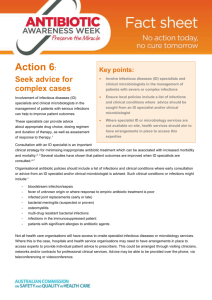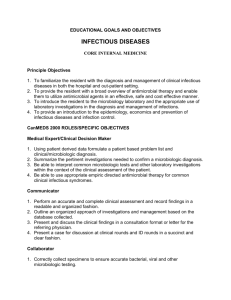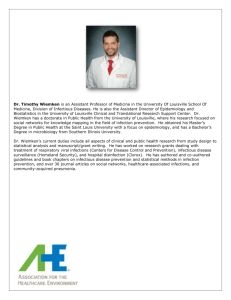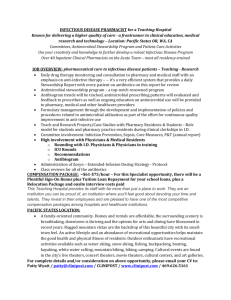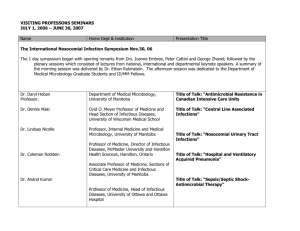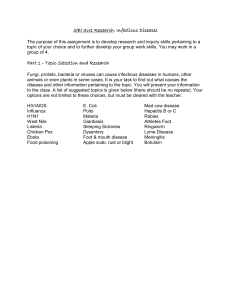Fact-Sheet-Action-6_Seek-advice-for-complex
advertisement
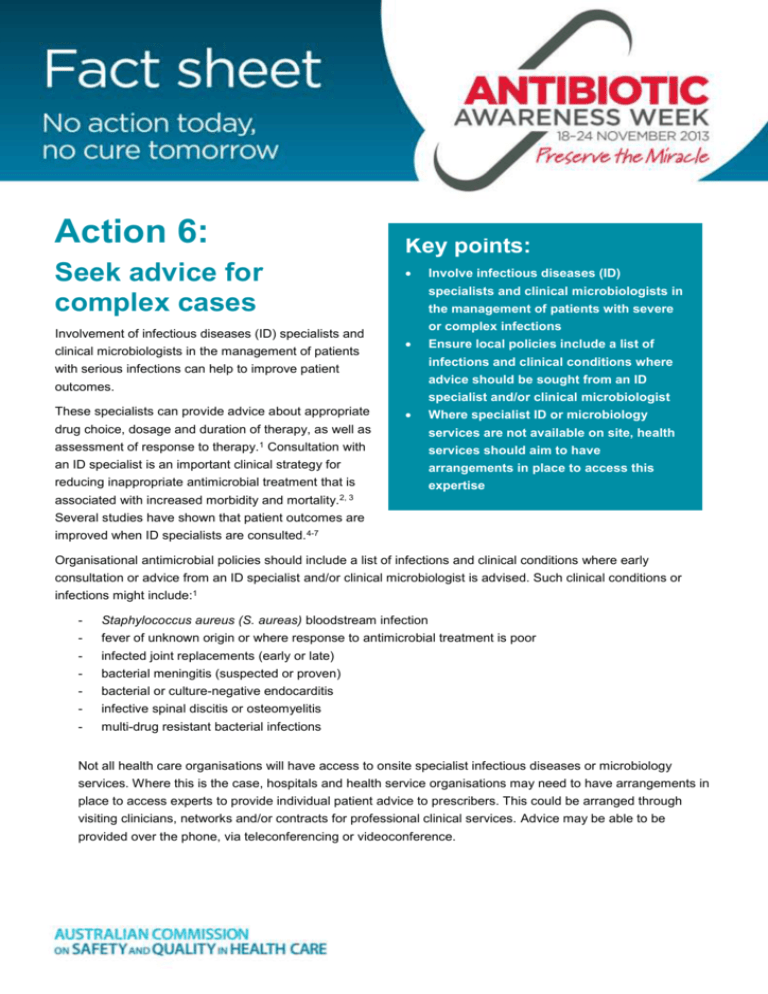
Action 6: Seek advice for complex cases Involvement of infectious diseases (ID) specialists and clinical microbiologists in the management of patients Key points: specialists and clinical microbiologists in the management of patients with severe or complex infections Ensure local policies include a list of infections and clinical conditions where with serious infections can help to improve patient advice should be sought from an ID outcomes. These specialists can provide advice about appropriate Involve infectious diseases (ID) specialist and/or clinical microbiologist Where specialist ID or microbiology drug choice, dosage and duration of therapy, as well as services are not available on site, health assessment of response to therapy.1 Consultation with services should aim to have an ID specialist is an important clinical strategy for arrangements in place to access this reducing inappropriate antimicrobial treatment that is expertise associated with increased morbidity and mortality.2, 3 Several studies have shown that patient outcomes are improved when ID specialists are consulted. 4-7 Organisational antimicrobial policies should include a list of infections and clinical conditions where early consultation or advice from an ID specialist and/or clinical microbiologist is advised. Such clinical conditions or infections might include:1 - Staphylococcus aureus (S. aureas) bloodstream infection - fever of unknown origin or where response to antimicrobial treatment is poor - infected joint replacements (early or late) - bacterial meningitis (suspected or proven) - bacterial or culture-negative endocarditis - infective spinal discitis or osteomyelitis - multi-drug resistant bacterial infections Not all health care organisations will have access to onsite specialist infectious diseases or microbiology services. Where this is the case, hospitals and health service organisations may need to have arrangements in place to access experts to provide individual patient advice to prescribers. This could be arranged through visiting clinicians, networks and/or contracts for professional clinical services. Advice may be able to be provided over the phone, via teleconferencing or videoconference. References and further reading 1. Duguid M, Cruickshank M (editors). Antimicrobial Stewardship in Australian Hospitals. Sydney: Australian Commission on Safety and Quality in Health Care, 2011. 2. Kollef M. Inadequate antimicrobial treatment: an important determinant of outcome for hospitalized patients. Clinical Infectious Diseases 2000;31(Suppl 4):S131-S138 3. Drew R, White R, MacDougall C, Hermsen E, Owens R, Jr, Society of Infectious Diseases Pharmacists. Insights from the Society of Infectious Diseases Pharmacists on antimicrobial stewardship guidelines from the Infectious Diseases Society of America and the Society of Epidemiology of America. Pharmacotherapy 2009;29(5):593-607 4. MacArthur R, Miller M, Albertson T, Panacek E, Johnson D, Teoh L, Barchuk W. Adequacy of early empiric antibiotic treatment and survival in severe sepsis: experience form the MONARCS trial. Clinical Infectious Diseases 2004;38:284-288 5. Petrak R, Sexton D, Butera M, Tenenbaum M, MacGregor M, Schmidt M, Kemmerly JW, Dougherty M, Bakken J, Curfman M, Martinelli L, Gainer R. The value of an infectious diseases specialist. Clinical Infectious Diseases 2003;36:1013-1017 6. Byl B, Clevenbergh P, Jacobs F, Struelens M, Zech F, Kentos A, Thys J. Impact of infectious diseases specialists and microbiology data on the appropriateness of antimicrobial therapy for bacteremia. Clinical Infectious Diseases 1999;29:60-66 7. Filice G, Abraham J. Infectious diseases involvement for Staphylococcus aureas bacteremia was associated with appropriate therapy and fewer relapses. 48 th Interscience Conference on Antimicrobial Agents and Chemotherapy. Washington DC, 2008: Abstract K3471 This document is intended for use by health professionals. It has been created from information contained in Antimicrobial Stewardship in Australian Hospitals 2011 and reviewed by clinical experts. Reasonable care has been taken to ensure this information is accurate at the date of creation. This fact sheet is intended to be used in it original version. It can be downloaded from the Australian Commission on Safety and Quality in Health Care web page www.safetyandquality.gov.au/aaw2013 “No action today, no cure tomorrow” is adopted from the WHO World Health Day 2011. 2
